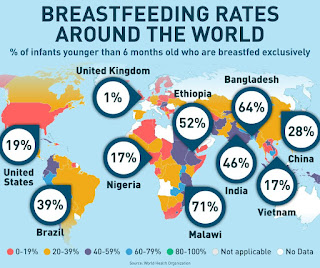 |
| Source :WHO |
Breastfeeding is a norm in Nigeria, but exclusive breastfeeding is not. Babies below six months of age most times are given other foods or liquids. Exclusive breastfeeding; feeding an infant on breast milk alone, is the gold standard for babies below six months old as it not only contains all the nutritional needs of babies that age but also protects them from several types of diseases. It has repeatedly been described as the safest and healthiest option for feeding infants. Experts recommend it should start from the first hour of a baby's life as this not only gives the baby good supply of the nutrient-rich colostrum which safeguards infants from dying during the most vulnerable time of their life, but also helps establish and increase the supply of the more mature breast milk.
Today, the evidence on the power of exclusive breastfeeding is stronger than ever.
Many mothers choose to practice this form of infant feeding but get discouraged at some point either by the opinions of family members or the advice of poorly trained health workers,or even by several myths surrounding exclusive breastfeeding.
Breast milk is said to be a potent medicine for disease prevention that is tailored to fit the needs of a baby, it has been described as the perfect elixir of immunity for infants. Feeding a baby below six months on breast milk alone gives the baby a complete dosage of this potent medicine; this also keeps the baby safe from contaminants in food and water that can cause diarrhea. It also makes makes the baby less susceptible to ear infections, pneumonia and several other childhood illnesses.
A recent document published by the World Health Organization titled "From the first hour of life: making the case for improved infant and young child feeding everywhere" described breast milk as 'the most personalized form of medicine that any of us will receive in our lifetime'; this is largely because antibodies are produced to combat specific infections a baby is exposed to- a mother's body writes a prescription for illnesses unique to her baby's needs and environment. Human milk apart from being an excellent source of nutrients for an infant also contains a variety of immune components such as antibodies, growth factors, cytokines, antimicrobial compounds and specific immune cells. Feeding infants the recommended way gives the infant the recommended dosage of this highly personalized medicine.
 |
| Source:WHO |
Exclusive breastfeeding has been described as a high-impact, cost-effective solution for saving children's lives. As infants breastfeed, the immune composition of breast milk adjusts to the properties of their saliva. If the mother's body detects pathogens, it produces antibodies to fight them. There is the risk of contamination from non-breast milk feedings which can expose vulnerable newborns to life-threatening pathogens; besides they can take up valuable space in the newborn's stomach, leaving little room for complete breast milk .
Exclusive breastfeeding guarantees infants a food source that is uniquely adapted to their needs while being safe, clean, healthy and accessible. According to the WHO document quoted above, feeding a baby below six months of age other things except breast milk makes the baby 2.8 times more likely to die than those who were exclusively breastfed; exclusive breastfeeding can prevent 53% of hospital admissions for diarrhea and 27% of hospitalizations for lower respiratory infections each month. Research also suggests increases in a child's long-term heart capacity and shape in exclusively breastfed babies than those fed with infant formula.
For a child six months and below, other foods are at best unnecessary and at worst life-threatening. Let us therefore join hands to promote this great infant feeding practice which has the potential to save countless lives.



















